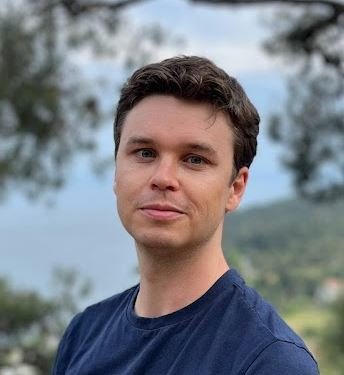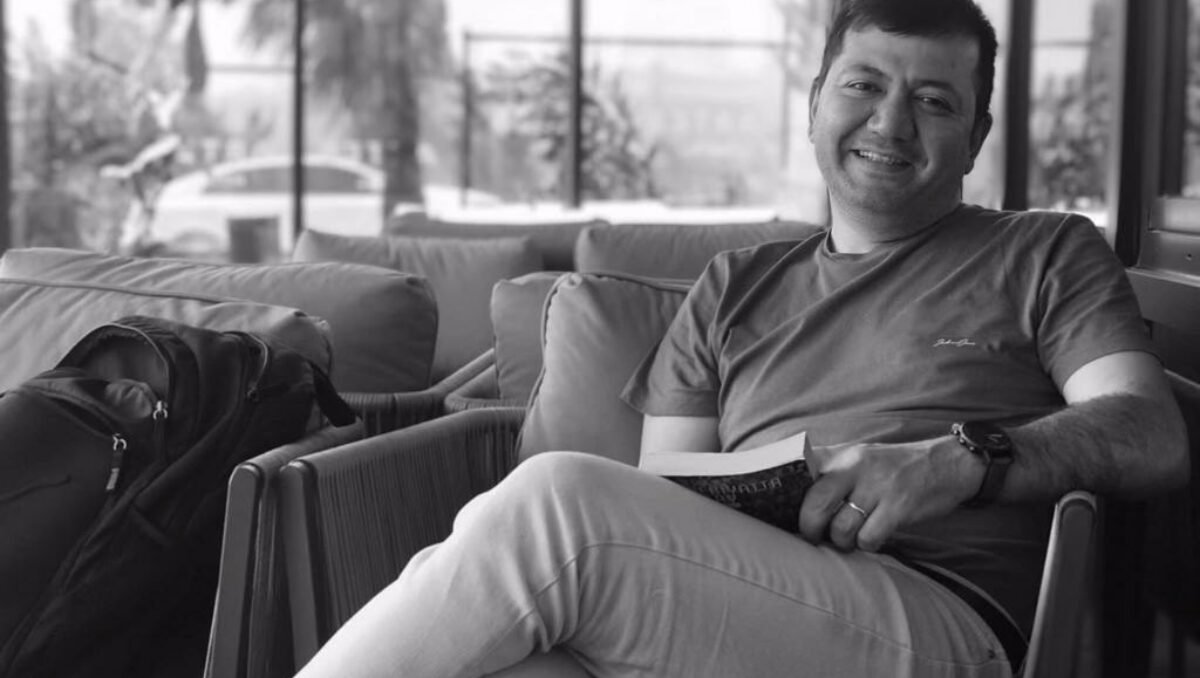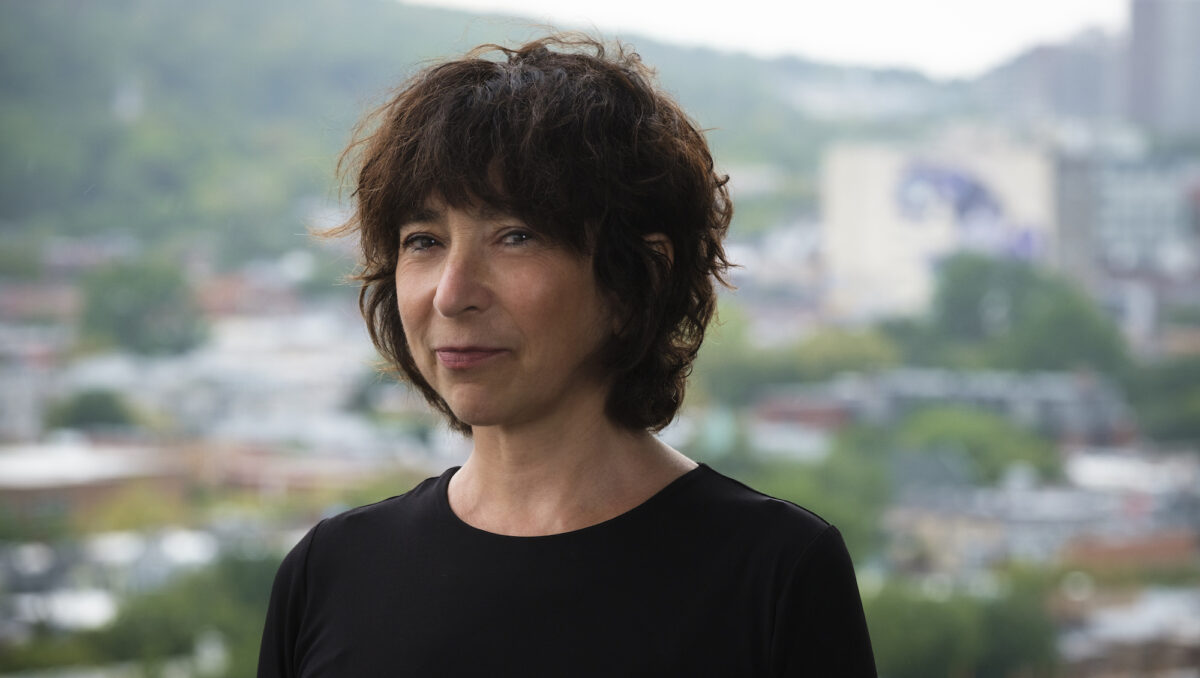(JANUARY) by Hanna Riisager trans. Kristina Andersson Bicher
I see the subject all
the time in front of me, see all these
small rituals.
How it lies on the sofa and waits
for me to come.
The wind pushes moirés of ice and snow
against the windowpane. An undulating, pearl gray surface –
silk bark.
My brain’s pale tissues
unfold in the room in a billowing mass.
I’m floating under the roof, looking down.
The subject stays on the sofa. Smoothed
waxed, with a distilled stiffness
in the facial musculature.
I smile. Hug
the clots of the heart, my dark charms.

Kristina Andersson Bicher is a poet, essayist, and translator. Her work has been published in AGNI, The Atlantic, Ploughshares, Colorado Review, Brooklyn Rail, Harvard Review, Hayden’s Ferry, Plume, Narrative, and others. She is author of the poetry collection She-Giant in the Land of Here-We-Go-Again (MadHat Press 2020) and Just Now Alive (FLP 2014), as well as a translation of Swedish poet Marie Lundquist’s I Walk Around Gathering Up My Garden for the Night (Bitter Oleander Press 2020).
THREE POEMS by Nadja Küchenmeister trans. Aimee Chor
at the base
no one quite knew how late it was
when it was too late: i came back
a breeze took my hand, the courtyard
recognized me, as always, without waking
i picked out the old names on the name plates
bein, puhahn, henke, brumm, i let them dry
no clothespins on the clothesline
where there was a puddle, no longer a puddle
where no trees stood, there stood trees
the hedge conversed with me, softly, a shadow
under the ping pong table, only the lifespan of the streetlights
seemed longer than an afternoon: mr. schatta
has slept in the graveyard for twenty-five years
for twenty-five years i have been asleep too
no one quite knows how late it is, when it is too late
benches without backrests, as always deli-counter light
the small flakes on my lips, that scrap of skin
i push around at the base of my tongue, i am.
after the conversations
it is as if your furniture had decided
on its own where it would like to stand
a circumspect silence of wood
the bed in its corner in the hall
the bookshelves, their load
mystery novels, political texts
there is nostalgia for plastic
bags near the closet i catch
a scent, harsh in its sweetness
wallpaper flakes away here and there
from the walls, where did the brownish stain
on the ceiling come from, on the dresser
a framed photo of my childhood
friends, they are still looking at you
silent and dusty: this is how one grows old.
scorpion or spider
you’re saying something about matter and dark space
and your arms spread out wide, as if you wanted
to cradle a zeppelin, stars, electrodes
voices approach, grow distant, monitors
something hisses, your lungs, and these white
machines, seductively cold, know almost everything
about you, cables, hoses, the door hangs lightly
on its hinges on a glowing hot sunday
afternoon dust motes float in the air like bird
feathers on water…we follow them
as they fall, flakes of skin fall
we do not hear the steps in the hall
until we see shoes, an animal in my back
scorpion or spider, marks the break: i could not
find a container for the teeth, i’m sorry, nor
for the toothbrush, the comb, there are more hand
kerchiefs in the bag, the phone and your reading glasses
two shirts, socks, some pairs of underpants.

Aimee Chor is a poet and translator in Seattle. Her translations have appeared or are forthcoming in Sepia, The Apple Valley Review, AzonaL, and mercury firs. She can be found on Twitter @aimeechor and at https://commonplaces.netlify.app.
- Published in ISSUE 27, Translation
AROUND THE FIRE by Gloria Susana Esquivel trans. Joel Streicker
“En llamas será la canción”
Briela Ojeda
Everything was in flames.
She felt a slight burning in her eyes and thought, for an instant, that the smoke choking the images on the TV had filtered into the room.
She blinked, then turned her attention back to the newscast. Ten million hectares were burning uncontrollably. The world ablaze.
She tried to grasp the magnitude of the disaster, imagining the fire spreading through all her belongings. Her clothes, her daughter’s toys, her husband’s shoes, the air fryer—all of it in flames. All the kitchen gadgets that she’d bought in the past year—because she’d promised to be the type of mother who baked homemade cookies and cakes for her daughter—and that had never been touched, blazed in her mind in just the same way as the bamboo forest.
The red light of the TV bounced off the room’s white walls, casting them in a warm glow. But she felt cold. She remembered that she was naked and that it was raining outside. She covered herself with a towel and sat on the edge of the bed. On the screen, the mass exodus of animals played on repeat. A koala clutched onto the highest branch of a tree that would soon be laid waste. She searched for a glimmer of terror in the animal’s eyes but found only blackness. And then the red, the yellow, and again the red devoured everything. She glanced down at her legs, which trembled slightly, and found traces of a bite. She rubbed her skin, trying to make the mark disappear, but the cool surface of her thigh wouldn’t cooperate.
She closed her eyes. She tried to recall the aroma of cinnamon and butter cookies that she had promised to bake, tried to recall her husband’s smell. But the only thing she recognized was the odor of cigarettes in her hair and a taste of rust on her palate. She hadn’t had much to drink that night—not as much as the young man—but the sour taste of alcohol and pills had settled in her mouth. Feeling nauseous, she opened her eyes. The landscape stretched out on the TV screen. A red line, very bright, divided the darkness of the earth from that of the sky—like a streak of light in the night or a very red tongue on a pale torso.
The phone rang.
On the other end, the voice of the man at the front desk sounded harried. She kept her gaze fixed on the flames invading the screen. It took her a few seconds to understand what was happening. She came back to earth as the voice explained that the young man’s credit card had been declined and that the hotel needed some other form of payment. She climbed out of bed to fetch her purse, availing herself of the TV’s blue brightness to search for one of her cards. She began to dictate the numbers slowly in an attempt to stop the frantic stream of words coming from the other end of the line. When everything was in order, she hung up.
She got in the shower.
The mark on her thigh spread as soon as the hot water hit her leg, and she had a vision of the young man crawling over her thighs. She closed her eyes and let herself be carried away by the sensation of the water hitting her back. With the impact of each drop, memories of what had happened that night reappeared. A couple of drinks. Kisses inside a bathroom stall. The impulse to escape to the nearest hotel. The neon light of the front desk hurting her eyes, its bright white flickering deforming the face of the young man. She opened her eyes and turned around, facing the showerhead, then parted her lips to receive a mouthful of cold water, remembering the touch of that other skin. Her desire to lick it. To bite it. How she succumbed to instinct and nibbled on his ears. She turned, enjoyed how the water slid over her buttocks. She thought of how she’d dug her nails, and then her teeth, into him, and how he hadn’t put up any resistance to the blade of her incisors. She was still hungry, but it was too late to find anyone else and no restaurants would be open. She turned off the faucet and covered herself with the towel again.
On the screen, the orange sky seemed to announce the end of times. A few men fought against the flames, but their efforts seemed futile. The force of the water expelled by their hoses was puny compared to the magnitude of the disaster. She saw the screen of her cellphone light up and, curious, she approached the night table. Fifteen text messages and twenty missed calls. Maybe her husband had forgotten the good-night conversation they’d had? She’d known him for seven years and, during that entire time, she had tested out a large repertoire of excuses and lies to keep his questions at bay. Work trips. Visits to her mother. A yoga retreat that promised to align her chakras. Lying to him was a matter of life and death. How else was she going to maintain her sanity? She needed to get out of the house at least three times a year. She needed those feasts of young flesh.
Everything was a question of balance, she told herself, each time she returned home sated after one of those hunting expeditions. She would kiss her daughter’s head and ask her husband to watch a romantic movie with her—sometimes she even offered to make popcorn—and forget about everything else. The looks. The touches. The fingers submerged in mouths. The nakedness. The blades and the bites. Sitting on the comfortable couch in her house, it was hard for her to recall the flavor of blood, the taste of rust that clung to her teeth, much less the fibrous texture of the young men with whom she satiated an ancestral hunger.
She lay back in the bed and began to examine the messages exploding her phone.
At her side, the body of the young man lay immobile. The image of a desolate highway sent a strong shudder through her. What had been trees were now frail black lines barely managing to remain upright. The cameraman had captured a white horse galloping, terrified, and an orphaned kangaroo in the immensity of the red landscape. She felt the impulse to talk with the young man about what she was witnessing, but the images of smoke swallowing everything up distracted her. She took a deep breath. Her husband had linked the credit card to his cellphone and had received a notification of the transaction at this downtown hotel. She felt herself observed, but instead of shame, she felt rage. Hadn’t those silences given them a quiet life? What did he gain by tracking her? Was he ready to burn everything down?
The first messages had a worried tone. She recalled the koala’s empty gaze, then the young man’s look of terror, and thought about how her husband’s eyes always seemed blank. The best thing to do would be to think of a lie. Tell him that her credit card had been cloned, and that’s why that transaction for a room in a sketchy hotel was appearing. But the messages that followed were a torrent of complaints and demands. He had called her friends. Her mother. Nobody knew where she was that night. No possible lie would pacify the anger of that man who had left voice memos full of fury. He gave her an ultimatum. He would call the police. He would go look for her at the hotel. He would take away her daughter, and she wouldn’t see her again. How could she have lied to him?
She knew her husband well enough to know that those messages were only threats. He needed that whole performance—the wronged man, the repentant woman—just as much as she needed to occasionally escape from home. Besides, he was very prudent and put appearances above all. He would be incapable of making a fuss that the neighbors would overhear. Nonetheless, sitting on that hard bed, watching the devouring flames, she entertained for an instant the image of her husband bursting into the room.
She imagined the disgust on his face at having to pass, in the middle of the night, through streets inhabited by terrifying creatures, and she pictured the very white light at the front desk highlighting the acne marks on his cheeks. She saw him abusing the hand sanitizer in the reception area, anxious to armor himself against the ugliness of that cheap hotel.
She saw quite clearly the image of her husband entering the room in his disheveled pajamas, horrified, watching her lick her blood- and viscera-smeared lips. He would find her naked, examining the young man’s inert body, sniffing and fondling it, eager to enjoy its best parts. Her mouth would be red, very red and very bright, and only that brightness, her savage hunger, would be capable of illuminating her husband’s pale face. An explosion. Then another. She desired that scene, burned for it. She needed to see some genuine expression in the face of the man with whom she’d shared a bed for so many years.
But all she found was blackness.
And then the red and the orange.
The flames, still consuming everything on the screen, now bounced off the vacant stare of that man who observed her without even a glimpse of horror. Without allowing himself to burn. Controlling himself so that not a shout would escape him. So that nothing would alarm the neighbors.

Joel Streicker’s stories have been published in a number of journals, including Great Lakes Review, Gravel, Burningword, and New Flash Fiction Review. He won Cutthroat Magazine‘s Rick DeMarinis Short Story Contest in 2021 and Blood Orange Review’s inaugural fiction contest in 2020. He has published poetry in both English and Spanish, including the collection El amor en los tiempos de Belisario. His translations of such Latin American writers as Samanta Schweblin, Mariana Enríquez, and Pilar Quintana have appeared in A Public Space, McSweeney’s, and other journals. Streicker’s essays have appeared or are forthcoming in The Forward, Shofar, Le Monde diplomatique, edición chilena, Boletín cultural y bibliográfico, El Malpensante, and Letralia, among other publications. Photo Credit: Paul Asper
INVITATION TO END by Faris Kuseyri trans. Patrick Sykes
A woman puts an orange in her husband’s pocket
and her longing I saw
they’re opening unmarked graves with warrants
and silence’s strength I saw
truth bound, the papers lie
and hate in the words I saw
grace in the bazaar, conscience in exile
and the feigned surprise I saw
driven again to my pencil’s mercy
and the invitation to end I saw
from poison mouths the children kissing the vine
and their glass bravery I saw

Patrick Sykes is a journalist and writer based in Istanbul, Turkey.
- Published in ISSUE 27, Poetry, Translation
from YOU by Chantal Neveu trans. Erín Moure
first his breathing then his pupils
I watch his mouth
its furrows its swells
slight circle of his irises
the black hole a tube
he sees me
impulsion
an implicit programmatics
ascension
the facades the borough
remanence of Rio
a yard a garden
the staircase
winding
its gradations
compelling
the maples
alongside
the false acacias
figuration of caresses
swirled rumour of a fountain
faint sound
metallic taste of the city
a magnetism
from palate to nostrils
infra-resonance
warm silver
low table
the flakes of fish
air under the studio ceiling
a loge
we make acquaintance
summer solstice alters the sky
we deflect curiosity by foreseeing questions
private
spheres
spontaneous revelation
the ineffable
freshness of a stream
are we already naked
bared
we expose ourselves
fluidity
gravity
propensity
the charm
the intimacy
premise of a banquet
Hephaistos
Aristophanes
vestiges dionysiae vertiges
Empedocles
happiness
tenor of futures put to the test
at ease
we name
great loves
inflections
decades
les fidélités
promises made
offenses injuries miracles
the enduring friendships
gaie santé
current genealogy
virtual group portrait
numerous
already
he stands up
draughts
the bamboo imbibe their fill of rainwater
transfer of delectation
euphoria
temptation reparation
congruency
catalysis
paradoxical privilege
incursion
permissiveness
we draw close
to kiss
convergence

Erín Moure is a poet and poetry translator. Most recently: Chus Pato’s The Face of the Quartzes (Veliz Books, 2021) from Galician, and Chantal Neveu’s This Radiant Life (which won the 2021 Governor General’s Award for translation from French and the Nelson Ball Prize). A new book of poetry, Theophylline: A Poetic Migration via the modernisms of Rukeyser, Bishop, Grimké, has just been published by House of Anansi. https://erinmoure.mystrikingly.com Photo Credit: E. Sampedrin
- Published in ISSUE 27, Translation
- 1
- 2




